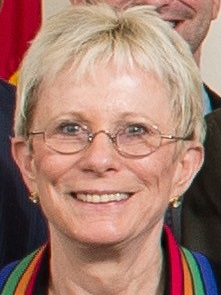Md. election board members to consider restricting administrator’s authority
By Glynis Kazanjian
 The Maryland State Board of Elections will consider restricting some authority from State Election Administrator Linda Lamone to interpret election law on her own after one of her rulings gave a fundraising advantage to Lt. Gov. Anthony Brown’s gubernatorial campaign without the board’s consent or knowledge in December.
The Maryland State Board of Elections will consider restricting some authority from State Election Administrator Linda Lamone to interpret election law on her own after one of her rulings gave a fundraising advantage to Lt. Gov. Anthony Brown’s gubernatorial campaign without the board’s consent or knowledge in December.
“There seems to be a momentum within the board for preventing this sort of situation from recurring,” said Rachel McGuckian, a Democratic member of the five-member board.
A motion to transfer some authority to review rulings back to the board will be made on Feb. 27 during the state board’s monthly meeting, according to McGuckian and other sources with knowledge of the board.
The ruling allowed Brown’s running mate, Howard County Executive Ken Ulman, to continue raising campaign funds during Maryland’s 90-day legislative session, while other candidates running for statewide office cannot. As a result, supporters of Attorney General Douglas Gansler, one of Brown’s Democratic rivals, are suing Lamone, Brown and Ulman.
“Since at least September 14, 2007, the Board has expressly delegated that duty to the administrator and her staff,” Jared DeMarinis, state board director of candidacy and campaign finance, stated in an email. “Section 13-103(a)(1) of the Maryland Election Law provides that the State Board shall prepare a summary of the election law that relates to campaign finance activity and provide for distribution of the summary.”
However, it has also been normal practice for the state board staff to seek a legal opinion from the Office of the Attorney general, said State Elections Board Vice Chairman David McManus (R). In the case of the Dec. 19 fundraising ruling, state board staff did not request a legal opinion from the attorney general’s office. Instead they asked the office to recuse itself from the guidance.
Four out of five board members needed
 A vote to revoke authority from the administrator would require a “super majority,” according to state election law. While “super majority” does not appear to be defined in the law, four board member votes would be required, said Andrew Levy, a private attorney with the firm of Brown, Goldstein & Levy in Baltimore, representing Lamone in the lawsuit. The board is made up of three Democrats and two Republicans.
A vote to revoke authority from the administrator would require a “super majority,” according to state election law. While “super majority” does not appear to be defined in the law, four board member votes would be required, said Andrew Levy, a private attorney with the firm of Brown, Goldstein & Levy in Baltimore, representing Lamone in the lawsuit. The board is made up of three Democrats and two Republicans.
Maryland law prohibits statewide office holders and members of the General Assembly from raising funds during the legislative session for state office, but it does not prohibit local officials and state officials running for local office from raising money.
Because Maryland moved its primary election from September to June, the issue of running mates of statewide officeholders legally raising campaign funds during Maryland’s 90-day legislative session became an important issue. The campaigns for governor have begun much earlier than in past election cycles, including the selection of running mates.
According to DeMarinis, the topic was first raised last summer by the Brown-Ulman campaign.
Lamone issued revised fundraising guidelines
After coming under fire during the state board’s January meeting for the December ruling, Lamone and state board staff issued additional fundraising guidelines, which cover all aspects of “coordination and cooperation” between candidates, campaigns and independent political action committees. Based on these new guidelines, it now seems nearly impossible for Ulman to legally raise campaign funds during the legislative session.
Attorney Dan Clements, a Gansler supporter who filed the lawsuit against the board, said: “In light of the interrelationship between Brown and Ulman, if they raise any funds during the session they are now both in violation of the clear intent and language of the law and the SBE guidelines.”
The Brown campaign would not say whether Ulman has continued to raise funds during session.
According to McGuckian, the revised guidelines were supposed to be discussed at the state board’s February meeting before being issued. However, Lamone released the revised guidelines Jan. 29 during a House of Delegates committee hearing.
“The SBE staff’s release of the new guidelines came as a surprise to me and other board members,” McGuckian said. “We had requested, and expected, that they would be included on our February agenda for discussion.”
Election administrator Linda Lamone declined to comment for this article. State board chairman Bobbie Mack (D) said the meeting agenda for February has not been finalized, and she disagreed with assertions that board members were left in the dark about the December ruling.
“We were given the information with the opportunity to pose questions,” Mack wrote in an email response. “Could we have been given a bit more advanced notice of the issue? Perhaps.”
Board members were emailed the campaign finance rulings on Dec. 19 — the same day they were released to the public, McManus said, but board members were only advised the guidelines were being issued and were not asked to comment. State board members Patrick Murray (D) and Charles Thomann (R) did not respond to multiple requests for comment.

MarylandReporter.com is a daily news website produced by journalists committed to making state government as open, transparent, accountable and responsive as possible – in deed, not just in promise. We believe the people who pay for this government are entitled to have their money spent in an efficient and effective way, and that they are entitled to keep as much of their hard-earned dollars as they possibly can.



